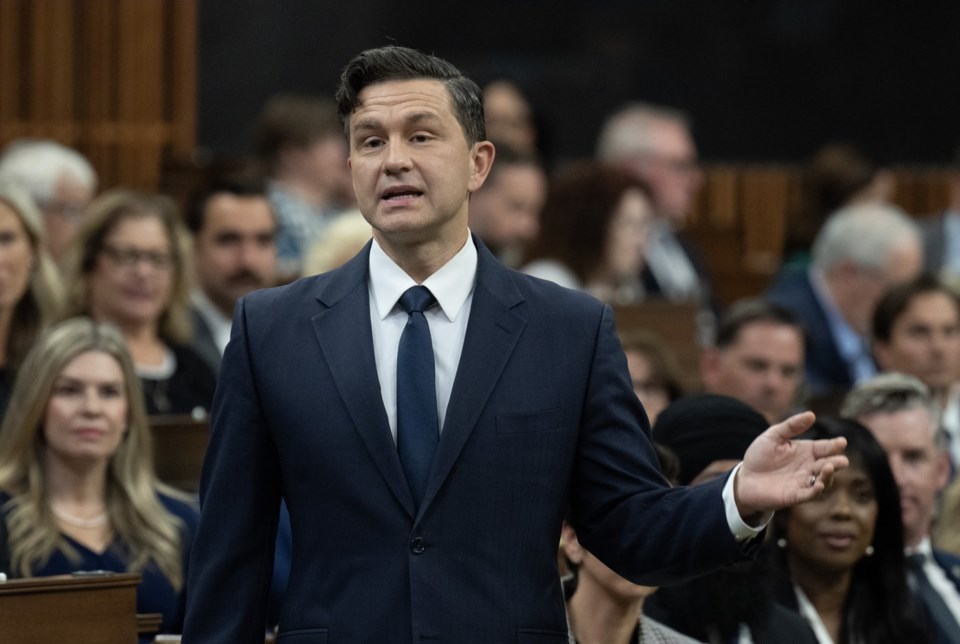OTTAWA — Conservative Leader Pierre Poilievre urged MPs to defeat the Liberal government on Tuesday, but opposition parties are turning the debate on his non-confidence motion into a referendum on the Conservative party's policies instead.
Poilievre introduced a non-confidence motion in the opening minutes of the House of Commons sitting Tuesday, delivering a campaign-style speech laying out his vision for Canada under a Conservative government.
He said his plan is "to bring home the promise of Canada, of a powerful paycheque that earns affordable food, gas and homes and safe neighbourhoods where anyone from anywhere can do anything. The biggest and most open land of opportunity the world has ever seen: that is our vision."
Polls have favoured the Conservatives for more than a year now, and if they were to hold true in the next election it could result in a Conservative majority government.
Poilievre told the House if that happens he would lower taxes and eliminate the price on carbon, instead fighting climate change by approving large-scale green projects and using the revenues to reduce government debt.
"We will cap government spending with a dollar-for-dollar law that requires we find $1 of savings for every new dollar of spending," Poilievre said.
"We will cut bureaucracy, waste and consulting contracts."
Poilievre and his party have not been specific about where exactly those cuts will come from. The NDP's Jagmeet Singh asked Poilievre if his government would dismantle the dental-care program the Liberals instituted in co-ordination with the NDP, but the Conservative leader wouldn't say one way or another.
Those unidentified cuts are the very reason Singh said his party wouldn't vote to bring down the government.
"We are going to fight today against Conservative cuts and against the Conservative motion," Singh told the House.
Debate on the motion will conclude Tuesday with the vote scheduled to take place Wednesday afternoon.
Both the NDP and the Bloc Québécois indicated last week they would not support the non-confidence motion because they don't support the Conservatives. If they vote no, the motion will be defeated and the Liberal government will survive its first test since its supply-and-confidence deal with the NDP ended earlier this month.
If the motion were to pass, the government would be defeated and Canadians very likely would see an immediate election.
The Bloc Québécois said they'd rather use the opportunity presented by the minority Parliament to negotiate with the Liberals, rather than trigger an election that would likely install Poilievre as prime minister.
"We listen to the Conservatives and are not sure that we're so eager to see them take power," the Bloc's House leader Alain Therrien told the House in French on Tuesday.
He said Poilievre has no plan to address the challenges of Quebec's distinct society.
"There are situations in Quebec that are quite different from the rest of Canada," he said.
The Bloc has asked the Liberals to green-light the funding for their private member's bill to raise pension payments for seniors under the age of 75.
The government hasn't committed to doing that. The parliamentary budget officer has estimated the proposed change would cost about $16 billion over five years.
The debate in the House more closely resembled a debate over the Conservative vision for Canada than the government's, Liberal House leader Karina Gould said during question period.
"Today what we are doing is demonstrating that this House doesn't have confidence in the Conservative Party of Canada," she said.
The prime minister was not in Ottawa for the debate, and is instead representing Canada at the United Nations General Assembly in New York.
He was asked about the non-confidence motion after U.S. President Joe Biden used his speech at the UN to reflect on his decision to withdraw from his party's ticket in the upcoming election, saying that he chose to think about the people he serves rather than his own power.
"The Conservatives are very much thinking about power right now," Trudeau said in response.
"I'm thinking about how we can best help Canadians. I'm thinking about how to put the best balance sheet in the G7 in service of Canadians, to invest in Canadians. Confident countries invest in their citizens. Right now, Pierre Poilievre is offering cuts."
The Conservatives have another chance to introduce a non-confidence motion on Thursday during a second opposition day in the House of Commons. There are a total of seven opposition days required this fall, of which five will go to the Conservatives.
This report by The Canadian Press was first published Sept. 24, 2024.
Laura Osman, The Canadian Press




